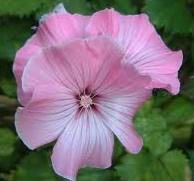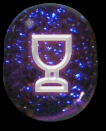Mallow
All the Mallows (Malvaceoe) to the number of a thousand, agree in containing mucilage freely, and in possessing no unwholesome properties.
Added Sep 9, 2010
| 8,321 Reads
All the Mallows (Malvaceoe) to the number of a thousand, agree in containing mucilage freely, and in possessing no unwholesome properties. Their family name "Mallow" is derived from the Greek malassein, "to soften," as alluding to the demulcent qualities of these mucilaginous plants. The Common Mallow is a well-known roadside plant, with large downy leaves, and streaked trumpet-shaped purple flowers, which later on furnish round button-like seeds, known to the rustics as "pickcheeses" in Norfolk and elsewhere, whilst beloved by schoolboys, because of their nutty flavour, and called by them "Bread and Cheese." Clare tells playfully of the fairies, borne by mice at a gallop:— "In chariots lolling at their ease, And recalls the time when he sat as a boy:— "Picking from Mallows, sport to please, Both this plant and its twin sister, the Marsh Mallow (Althoea hibiscus, from altho, to cure), possess medicinal virtues, which entitle them to take rank as curative Herbal Simples. The Sussex peasant knows the Common Mallow as "Maller," so that "aller and maller" means with him Alehoof (Ground Ivy) and Mallow. Pliny said: "Whosoever shall take a spoonful of the Mallows shall that day be free from all diseases that may come to him." This plant is often named "Round Dock," and was formerly called "Hock Herb": our Hollyhock being of the Mallow tribe, and first brought to us from China. Pythagoras held Malvoe folium sanctissimum; and we read of Epimenides in Plato, "at his Mallows and Asphodels." The Romans esteemed the plant in deliciis among their dainties, and placed it of old as the first dish at their tables. The laxative properties of the Mallow, both as regards its emollient leaves, and its radix altheoe efficacior, were told of by Cicero and Horace. The Marsh Mallow grows wild abundantly in many parts of England, especially in marshes near the sea coast. It gets its generic name althoea, from the Greek althos, "a remedy," because exercising so many curative virtues. Its old appellations were Vismalva, Bismalva, Malvaviscus, being twice as medicinally efficacious as the ordinary Mallow (Sylvestris). Virgil in one of his eclogues teaches how to coax goats with the "Haedorumque gregem viridi compellere hibisco." The root is sweet and very mucilaginous when chewed, containing more than half its weight of saccharine viscous mucilage. It is, therefore, emollient, demulcent, pain-soothing, and lubricating; serving to subdue heat and irritation, whilst, if applied externally, diminishing the painful soreness of inflamed parts. It is, for these reasons, much employed in domestic poultices, and in decoction as a medicine for pulmonary catarrhs, hoarseness, and irritative diarrhoea or dysentery. Also the decoction acts well as a bland soothing collyrium for bathing inflamed eyes. Gerard says: "The leaves be with good effect mixed with fomentations and poultices against pains of the sides, of the stone, and of the bladder; also in a bath they serve to take away any manner of pain." The mucilaginous matter with which the Marsh Mallow abounds is the medicinal part of the plant; the roots of the Common Mallow being useless to yield it for such purposes, whilst those of the Marsh Mallow are of singular efficacy. A decoction of Marsh Mallow is made by adding five pints of water to a quarter-of-a-pound of the dried root, then boiling down to three pints, and straining through calico. Also Marsh Mallow ointment is a popular remedy, especially for mollifying heat, and hence it was thought invaluable by those who had to undergo the ordeal of holding red hot iron in their hands, to rapidly test their moral integrity. The sap of the Marsh Mallow was combined together with seeds of Fleabane, and the white of an hen's egg, to make a paste which was so adhesive that the hands when coated with it were safe from harm through holding for a few moments the glowing iron. French druggists prepare a famous medicinal sweet-meat, known as Pate de gimauve from the root of the Marsh Mallow. In Palestine, the plant is employed by the poor to eke out their food; thus we read in the book of Job (chap. xxx. ver. 4), "Who cut up Mallows by the bushes, and juniper roots for their meat." In France, the young tops and tender leaves of the Marsh Mallow are added to spring salads, as stimulating the kidneys healthily, for which purpose is likewise prepared a syrup of Marsh Mallows (Syrupus Althoeus) from the roots with cold water, to which the sugar is afterwards added. The leaves, flowers, and roots, are employed for making ptisans. In Devonshire, this plant is termed by the farmers, "Meshmellish," also "Drunkards," because growing close by the water; and in the West of England, "Bulls-eyes"; whilst being known in Somerset as "Bull Flowers" (pool flowers). The root of the Marsh Mallow contains starch, mucilage, pectin, oil, sugar, asparagin, phosphate of lime, glutinous matter and cellulose. An infusion made with cold water takes up the mucilage, sugar, and asparagin, then the hot water dissolves the starch. The flowers were used formerly on May-day by country people for strewing before their doors, and weaving into garlands. The Geranium is said to have been originally a Mallow. Mahomet having washed his shirt while on a journey, hung it on a Mallow to dry, and the plant became therefore promoted to be a Geranium. Most probably, the modern French Pate de gimauve contains actually nothing of the plant or its constituents; but the root is given in France to infants, on which they may try their teeth during dentition, much as Orris root is used elsewhere. The laxative quality of the common Mallow was mentioned by "Exoneraturas ventrem mihi villica malvas The Musk Mallow (Malva moschata) is another common variety of this plant, which emits from its leaves a faint musky odour, especially in warm weather, or when they are drawn lightly through the hand. Its virtues are similar in kind, but less powerful in degree, to those of the Marsh Mallow.
Added Sep 9, 2010
| 8,321 Reads
Share The Magic ...
The GoE MONEY!!! Course - A Course In Real MONEY MAGIC!
|





















